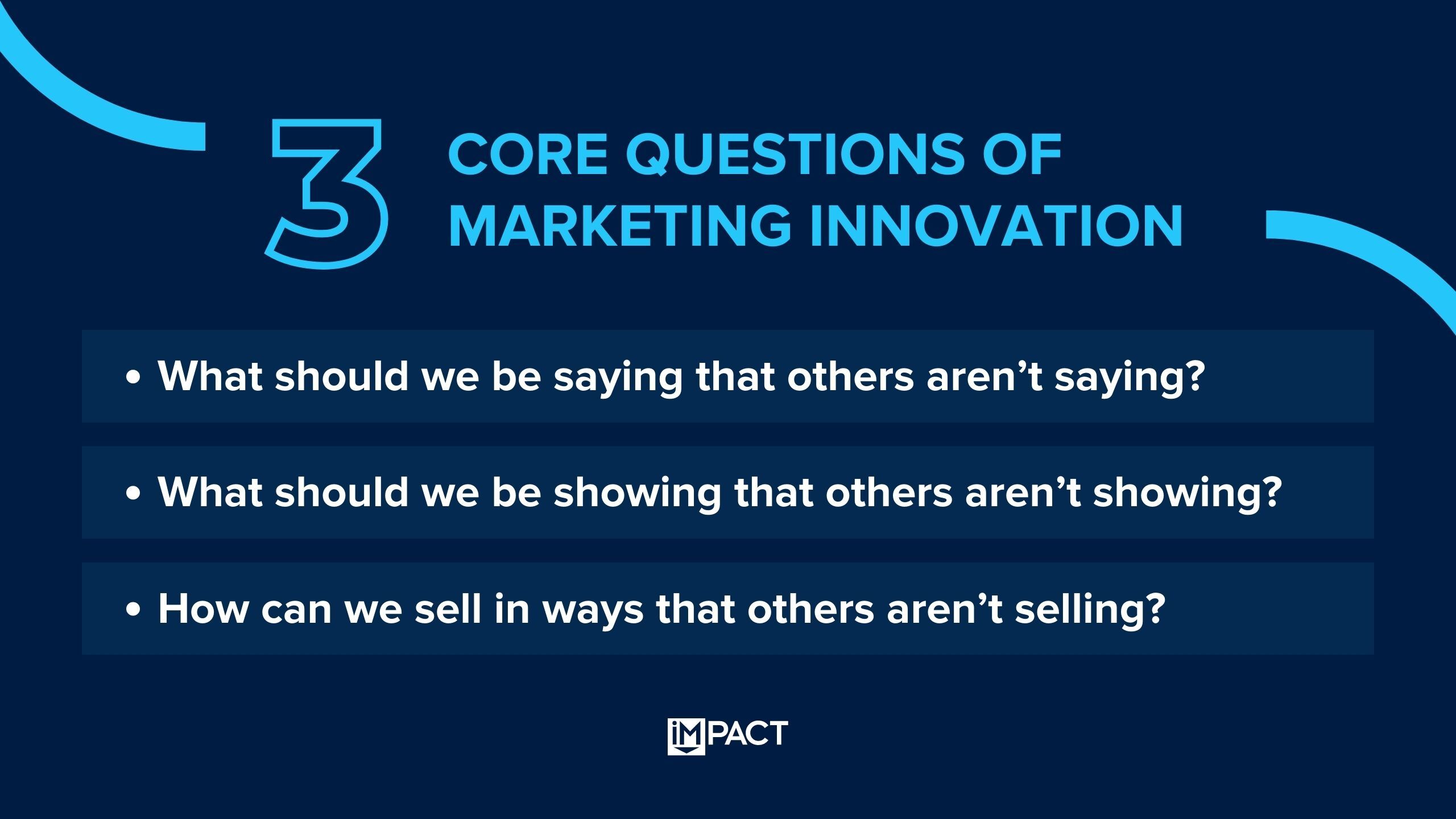Subscribe now and get the latest podcast releases delivered straight to your inbox.
How To Inspire Your Marketing Team To Try New Ideas

Jul 25, 2022

3 ways company leadership can empower marketers to try new ideas
- Look for reasons to say 'yes' to new ideas instead of defaulting to 'no.'
- Encourage (or require) team collaboration to give your marketers a first-hand glimpse into other departments.
- Send your team to conferences together that are outside of your core industry. This will get your teams thinking in new ways.
Too many marketers are stuck in a rut.
They’re running the same playbook, quarter after quarter. The results hold steady for a while, and then they might start to dip. But this gradual decline is not drastic enough for marketers to sound the alarm and develop new strategies.
Instead, it’s something many marketers are willing to ride out, accepting diminishing returns each month.
In my work as a speaker and business coach, I meet with thousands of professionals each year. This gives me a great cross-section of companies, industries, and roles. Unfortunately, this “stuck-in-a-rut” situation is a problem I see all too frequently. And it comes down to two issues:
- Marketers often play it safe and don’t push the envelope
- Business leaders rarely empower marketers to be daring and take risks
Obviously, these are closely tied, and I’ll explain the problems further and offer my solutions in the article below. I’ll cover:
- Why you always need to inspire your marketing team to try new ideas
- The three core questions of marketing innovation
- How business leaders can encourage experimentation
Why marketers always need to innovate
Marketing is one of those things you can never truly master. The next big thing quickly becomes old news, and selling something the same way for years is sure to bring in diminishing returns.
Even the best techniques and tactics can get improved with tweaks and updates.
Now, I’m not saying you need to chase trends or change who you are to fit a certain mold. In fact, you need to establish your core principles and then stick to them.
But that doesn't mean nothing changes. Marketers should always be thinking of creative ways to apply their core principles to new platforms, new situations, and new marketplaces.
A majority of marketers say that SEO is harder today than it was five years ago.
This makes sense. There is more content, more competition, and savvier search engines. There are hundreds of other statistics that show that digital marketing is getting harder — and that consumers are ever more wary of being marketed to.
In this sort of environment, you need to know the core principles of your business — and you need to be ready to apply them to new circumstances and settings.
Principles don’t change — tactics do
I tell organizations all the time that we are all in the business of trust. No matter what you sell, your customers won’t buy it if they don’t trust you.
We teach our clients to build trust with their audience by openly answering any questions they have.
But this is where the creativity comes in.
If your audience wants to know about how you compare to your competitors, you need to answer the question — but how you do it and where you do it is up to you.
You can build trust on TikTok, you can build trust in a blog article, and you can build trust in a 1:1 prospecting video.
The principle is the same, but the platforms and tactics are different. Each will require a unique approach.
The 3 core questions of marketing innovation
Every time marketing teams meet to discuss strategy or plan upcoming initiatives, they should ask themselves three fundamental questions:
1. What should we be saying that others aren’t saying? Ask yourselves if there are taboo topics in your industry. Why aren’t people covering those? Can you fill that void with your own content? Or, can you offer a fresh approach or more clarity around a topic that has already been covered?
2. What should we be showing that others aren’t showing? What perspective can you offer as an insider that outsiders don’t get? What claims do you make that aren’t visible to your audience?
3. How can we sell in ways that others aren’t selling? Buying habits continue to evolve and change. Are you committed to selling in new ways to meet your buyers where they are? Can you lead the field to sell in ways no one in your industry has tried yet?
Remember, buyers don’t want to be marketed to — they want to be educated. So, creativity in marketing is not about a catchy new phrase or a splashy new website. It’s about new ways to teach your audience what they’re looking to learn.

Each of these three core questions should inspire marketers to get creative in the way they address buyers’ questions, concerns, and uncertainties.
But to really do so, they need to keep learning from the people inside your company who know the most about what you sell and who you sell it to.
And they need encouragement from the top.
How business leaders can help marketing teams innovate
The second part of the equation is the business leaders. If you haven’t created a culture of innovation, don’t be surprised if your teams play it safe and stick to the same old thing.
So, how do you inspire your marketing team to try new ideas?
Look for reasons to say "yes"
I remember once hearing a woman speak about motherhood. She said that she decided to look for chances to say “yes” to her children. So often as parents, we default to no. It’s safer that way.
Business leaders can do the same thing. If someone comes to you with an idea for a new strategy or initiative, is your default to say no? Sure, there’s less risk that way, but there’s also less reward — and you’ll kill the innovative spirit of your team the more times you shoot them down.
This woman spoke about looking for reasons to say yes to her kids so she could let them try, fail, learn, and grow. Business leaders should consider doing the same.
Encourage (or require) team collaboration
I tell business leaders all the time: Force your marketers out of their bubble. Have them shadow a salesperson for a day, sitting in on meetings and calls. Have them work with your services team or your product designers.
I’ve never met a marketer who wasn’t full of ideas and creativity after spending a day with another team.
Send your teams to conferences
A good friend of mine runs a $150 million retail company. Despite his company’s size, he still has a hand in a lot of his company's marketing. He regularly writes blog articles, and he’s engaged with what the rest of the marketing team is doing.
He makes it a point to go with his marketing team to events, trade shows, and conferences. But here’s the thing: He doesn’t just go to learn about his industry.
He sells home appliances, but he’ll go see experts in many other retail spaces just so he can see cutting-edge ideas and tactics. That way, he can be on the forefront of applying these exciting ideas to his unique space.
The best marketing teams I know are always looking at other businesses, thinking about ways they can learn from companies and experts who are in totally different fields.
Innovate for the future
Any marketing initiative is an investment in the future. This is especially true with inbound marketing. That article you plan today will not get published for a few weeks and not rank in Google search results for a month or two. That new podcast you’re planning could take months to gain traction.
Preparing for the future is always a good plan, but you don’t know exactly what the future holds. This is something we’ve all learned the hard way these past few years with pandemic fallout, supply-chain interruptions, inflation, recessions, and more.
To prepare for an uncertain future, you need to be both steady and inventive.
- Be steady in your commitment to your core principles.
- Be inventive in your application of those principles in new contexts.
As a business leader, you’re the one who can encourage and facilitate innovation in your marketing team. Look for reasons to say yes. Some ideas will fizzle, some will take off — and you’ll be ready for what the future brings.
If you're ready to see how effective your current marketing strategy is, use this free assessment. You'll see how you compare to other businesses seeing success with digital marketing.

